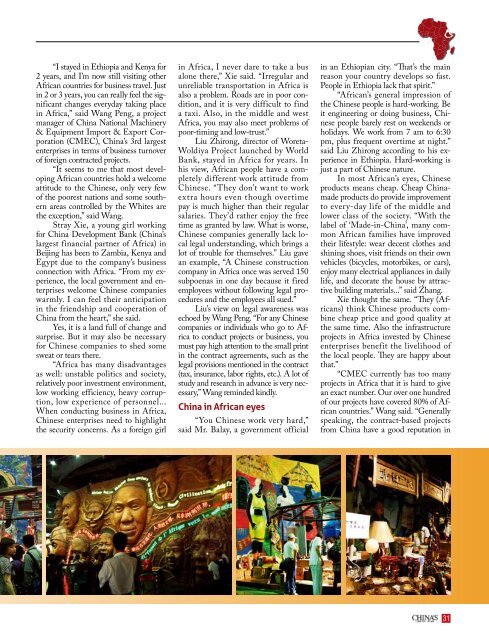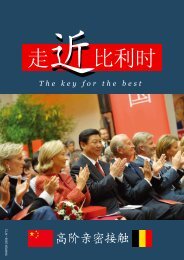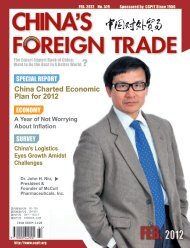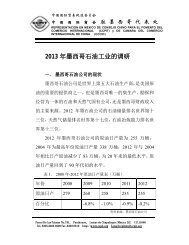Create successful ePaper yourself
Turn your PDF publications into a flip-book with our unique Google optimized e-Paper software.
“I stayed in Ethiopia and Kenya for<br />
2 years, and I’m now still visiting other<br />
African countries for business travel. Just<br />
in 2 or 3 years, you can really feel the significant<br />
changes everyday taking place<br />
in Africa,” said Wang Peng, a project<br />
manager of China National Machinery<br />
& Equipment Import & Export Corporation<br />
(CMEC), China’s 3rd largest<br />
enterprises in terms of business turnover<br />
of foreign contracted projects.<br />
“It seems to me that most developing<br />
African countries hold a welcome<br />
attitude to the Chinese, only very few<br />
of the poorest nations and some southern<br />
areas controlled by the Whites are<br />
the exception,” said Wang.<br />
Stray Xie, a young girl working<br />
for China Development Bank (China’s<br />
largest financial partner of Africa) in<br />
Beijing has been to Zambia, Kenya and<br />
Egypt due to the company’s business<br />
connection with Africa. “From my experience,<br />
the local government and enterprises<br />
welcome Chinese companies<br />
warmly. I can feel their anticipation<br />
in the friendship and cooperation of<br />
China from the heart,” she said.<br />
Yes, it is a land full of change and<br />
surprise. But it may also be necessary<br />
for Chinese companies to shed some<br />
sweat or tears there.<br />
“Africa has many disadvantages<br />
as well: unstable politics and society,<br />
relatively poor investment environment,<br />
low working efficiency, heavy corruption,<br />
low experience of personnel...<br />
When conducting business in Africa,<br />
Chinese enterprises need to highlight<br />
the security concerns. As a foreign girl<br />
in Africa, I never dare to take a bus<br />
alone there,” Xie said. “Irregular and<br />
unreliable transportation in Africa is<br />
also a problem. Roads are in poor condition,<br />
and it is very difficult to find<br />
a taxi. Also, in the middle and west<br />
Africa, you may also meet problems of<br />
poor-timing and low-trust.”<br />
Liu Zhirong, director of Woreta-<br />
Woldiya Project launched by World<br />
Bank, stayed in Africa for years. In<br />
his view, African people have a completely<br />
different work attitude from<br />
Chinese. “They don’t want to work<br />
extra hours even though overtime<br />
pay is much higher than their regular<br />
salaries. They’d rather enjoy the free<br />
time as granted by law. What is worse,<br />
Chinese companies generally lack local<br />
legal understanding, which brings a<br />
lot of trouble for themselves.” Liu gave<br />
an example, “A Chinese construction<br />
company in Africa once was served 150<br />
subpoenas in one day because it fired<br />
employees without following legal procedures<br />
and the employees all sued.”<br />
Liu’s view on legal awareness was<br />
echoed by Wang Peng. “For any Chinese<br />
companies or individuals who go to Africa<br />
to conduct projects or business, you<br />
must pay high attention to the small print<br />
in the contract agreements, such as the<br />
legal provisions mentioned in the contract<br />
(tax, insurance, labor rights, etc.). A lot of<br />
study and research in advance is very necessary,”<br />
Wang reminded kindly.<br />
China in African eyes<br />
“You Chinese work very hard,”<br />
said Mr. Balay, a government official<br />
in an Ethiopian city. “That’s the main<br />
reason your country develops so fast.<br />
People in Ethiopia lack that spirit.”<br />
“African’s general impression of<br />
the Chinese people is hard-working. Be<br />
it engineering or doing business, Chinese<br />
people barely rest on weekends or<br />
holidays. We work from 7 am to 6:30<br />
pm, plus frequent overtime at night.”<br />
said Liu Zhirong according to his experience<br />
in Ethiopia. Hard-working is<br />
just a part of Chinese nature.<br />
In most African’s eyes, Chinese<br />
products means cheap. Cheap Chinamade<br />
products do provide improvement<br />
to every-day life of the middle and<br />
lower class of the society. “With the<br />
label of ‘Made-in-China’, many common<br />
African families have improved<br />
their lifestyle: wear decent clothes and<br />
shining shoes, visit friends on their own<br />
vehicles (bicycles, motorbikes, or cars),<br />
enjoy many electrical appliances in daily<br />
life, and decorate the house by attractive<br />
building materials...” said Zhang.<br />
Xie thought the same. “They (Africans)<br />
think Chinese products combine<br />
cheap price and good quality at<br />
the same time. Also the infrastructure<br />
projects in Africa invested by Chinese<br />
enterprises benefit the livelihood of<br />
the local people. They are happy about<br />
that.”<br />
“CMEC currently has too many<br />
projects in Africa that it is hard to give<br />
an exact number. Our over one hundred<br />
of our projects have covered 80% of African<br />
countries.” Wang said. “Generally<br />
speaking, the contract-based projects<br />
from China have a good reputation in<br />
31

















